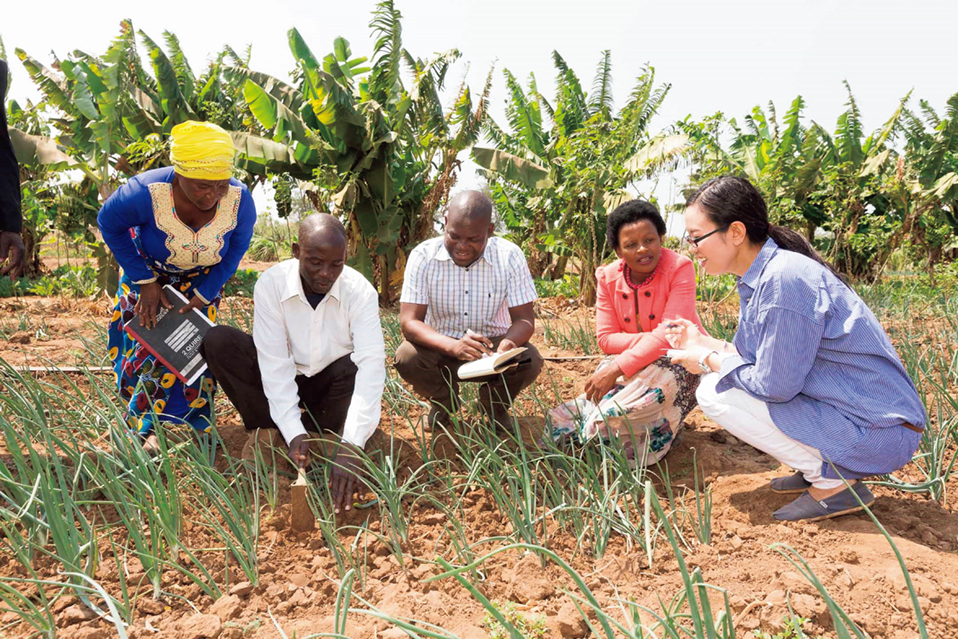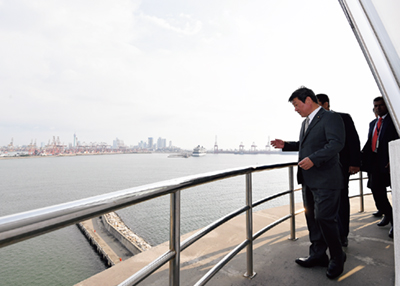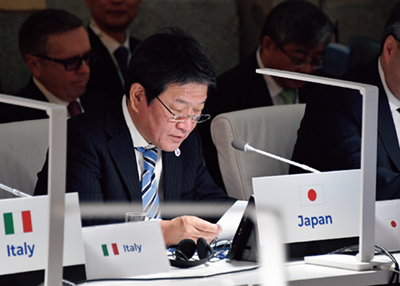Part II Measures for Each Priority Issue

A JICA expert checking the growing conditions of crops with her counterparts as part of the “Project for Market-Oriented Smallholder Horticulture Empowerment and Promotion” in Malawi (Photo: JICA)
Hereafter, in relation to Japan’s development cooperation (Note1) around the world, Japan’s recent efforts regarding three key issues will be introduced. These three issues are “1. Cooperation aimed at achieving ‘quality growth,’” “2. Sharing universal values and realizing a peaceful and secure society” and “3. Promoting efforts to address global issues and human security.”
1 Cooperation Aimed at Achieving “Quality Growth”
In order to enable developing countries to achieve economic growth aimed at self-reliant development, it is essential to aim for not only quantitative economic growth but also “quality growth.” “Quality growth” is growth that is “inclusive,” wherein the fruits of growth are shared with the society as a whole, leaving no one behind. It must also be “sustainable” in that growth can be sustained in harmony with society and the environment, and “resilient” against economic crises, natural disasters, and other shocks. These are some of the challenges that Japan has tackled in its postwar history. Japan is providing support to enable developing countries to achieve “quality growth” by utilizing its experience, expertise, lessons learned, and technology.
(1)Development of Industrial Infrastructure and Industries and Economic Policy
In order to achieve “quality growth,” it is important to improve the socio-economic infrastructure that serves as the foundation for the development of developing countries. Moreover, it is crucial that the private sector plays a central role, and important to boost private sector activities, such as the development of industries and the expansion of trade and investment. In developing countries beset by numerous challenges, it can sometimes be difficult to develop capacities or set in place an environment for promoting trade and attracting private investment. Thus, support from the international community is required.
●Japan’s Efforts
Quality Infrastructure
When investing in infrastructure, it is crucial for the infrastructure planning to be based on the needs of the country concerned, in addition to the quality of the infrastructure itself being user-friendly, safe, and disaster resistant. Japan develops quality infrastructure in developing countries and regions in line with their economic and development strategies, and trains human resources to maintain and operate this infrastructure. Japan’s strength lies in developing infrastructure that is truly contributory to “quality growth” in developing countries, which includes technology transfer and job creation.
The “G7 Ise-Shima Principles for Promoting Quality Infrastructure Investment,” which was agreed at the G7 Ise-Shima Summit in 2016, is positioned as the first step towards sharing the recognition on the basic elements of “quality infrastructure investment,” or investment for the development of infrastructure that contributes to “quality growth.” Furthermore, the importance and various elements of quality infrastructure investment were also agreed upon at the G20 Hangzhou Summit held under China’s Presidency. Based on the agreements by the G7 and the G20 thus far, discussions were carried out at G20 meetings under Japan’s Presidency toward formulating principles to maximize the positive impacts brought about by infrastructure investment on the economy, environment, and society while newly incorporating components such as strengthening infrastructure governance, including debt sustainability at the country level. As a result, at the G20 Osaka Summit held in June 2019, the “G20 Principles for Quality Infrastructure Investment” were endorsed by the G20 leaders, including emerging donors, as principles that show the common strategic direction and vision concerning future quality infrastructure investment (see “Connecting the World in 2019” for details).
In order to resolve development challenges such as global growth, poverty, and disparities, the Government of Japan will continue to spread the “G20 Principles for Quality Infrastructure Investment” to the entire international community. Moreover, Japan will cooperate with countries around the world including in Asia as well as international organizations such as the OECD to promote the international standardization of “quality infrastructure investment,” and work to reflect and implement quality infrastructure investment in individual projects.

Foreign Minister Motegi visiting Colombo Port in Sri Lanka, which is being developed with support from Japan (December 2019)

Foreign Minister Motegi attending the 14th Asia-Europe Meeting (ASEM) Foreign Ministers’ Meeting (December 2019)
Kiribati
Project for Reconstruction of the Nippon Causeway
Grant Aid (January 2017 - April 2019)

The “Nippon Causeway,” which was so named to express the gratitude of the people of Kiribati to Japan, is a 3.4-kilometer highway constructed by Dai Nippon Construction through a grant aid project for the Construction of the Batio-Bairiki Causeway and Fisheries Channel in 1985.
This causeway is the only land route on the Tarawa atoll, the capital of Kiribati. The route connects Besio Island in the southwestern end, which has an international port, to the slender region of small islands that stretches to North Tarawa, and has played an important role as a lifeline for the people. However, problems such as partial road damage became more serious due to aging and waves at high tide over many years. Therefore, this two-and-a-half-year reconstruction project was started in January 2017 to rebuild the road with the help of Dai Nippon Construction.
The road surface became higher after the reconstruction, and a wall of sufficient height was installed on the side facing the open sea with tossing waves. This resulted in lowering the risk of traffic cut-off due to large waves. The project also improved road safety by widening the road and installing streetlights and signs in consideration of pedestrian safety. Furthermore, electric wires, water pipes, and telephone lines that were previously buried in the ground were put in concrete boxes that run along the road. This improved the sustainability and durability of these infrastructures and also reduced the risks posed to the structure of the road by maintenance work.
In these ways, the Nippon Causeway that was rebuilt through the reconstruction project represents “building resilience against natural disasters,” as set forth in the “G20 Principles for Quality Infrastructure Investment” adopted in 2019. In addition, as an economic and social infrastructure that embodies adaptation to climate change and the “Build Back Better” philosophy advocated in disaster risk reduction frameworks, it is expected to contribute to the social and economic development of Kiribati for many years.

The causeway before reconstruction, affected by waves at high tide (Photo: JICA)

The causeway after reconstruction (Photo: Dai Nippon Construction)
Improving the Trade and Investment Environment

Products made under the One Village One Product campaign in Malawi being exhibited and sold at an international trade fair (Photo: JICA)
Japan utilizes ODA and Other Official Flows (OOF)* to support the development of small and medium-sized enterprises (SMEs), transfer of Japan’s industrial technology, and formulation of economic policies in developing countries. In addition, Japan supports the development of the trade and investment environment and economic infrastructures in order to enhance the export capabilities and competitiveness of developing countries.
At the Seventh Tokyo International Conference on African Development (TICAD7) held in Yokohama in August 2019, the representatives discussed assistance to develop the African private sector and the expansion of trade and investment between Japan and Africa. Prime Minister Abe stated that the Government of Japan would exert every effort to further increase private investment in Africa, which was at a level of $20 billion over the past three years. To crystalize such a goal, Japan will provide support for the promotion of industrial human resources development as well as innovation and investment.
In addition, the World Trade Organization (WTO) emphasizes the significance of promoting the development of developing countries through their participation in the multilateral free trading system. Japan has contributed to the trust fund set up within the WTO with an aim to strengthen the capacity of developing countries to engage in trade negotiations and participate in the global market, and to raise their ability to implement the WTO agreements.
With regard to access to the Japanese market, Japan has implemented the Generalized System of Preferences (GSP), which applies tariff rates that are lower than the general tariff to products originating from developing countries. Furthermore, for the Least Developed Countries (LDCs),* Japan applies duty-free quota-free access* by introducing a special preferential treatment. Through these schemes, Japan intends to encourage the import of products from developing countries. Moreover, Japan is actively promoting Economic Partnership Agreements (EPA),* and it is expected that the liberalization of trade and investment will also contribute to economic growth in developing countries.
Discussions regarding “Aid for Trade (AfT)”* have intensified in various international organizations, including the WTO and the OECD, as a means of further promoting support from developed countries, such as that of Japan. Japan is providing funds for the development of transportation networks, including ports, roads, and bridges, as well as for projects to construct facilities such as power plants and power grids, all of which are vital for developing countries to engage in trade. Japan is also implementing technical cooperation in trade-related areas, including the training of customs’ officials and intellectual property rights experts.
Furthermore, Japan provides assistance to small-scale production groups and small companies in developing countries over the “One Village, One Product Campaign.”* In addition, to attract private sector investment in developing countries, Japan advances such supports by identifying unique challenges in those countries, and by offering recommendations or advice to this extent.
Moreover, the implementation of the “Trade Facilitation Agreement (TFA),”* which entered into force in February 2017, is expected to improve the challenging situations Japanese companies frequently face at export destinations, such as lack of transparency and arbitrary application of trade procedures, and to boost trade and other economic activities by Japanese companies, which not only export finished goods, but also develop supply chains on a global scale. In addition, its implementation is also expected to help developing countries to expand trade and investment by reducing the trade transaction costs, prevent illegal exports, and improve the collection of customs duties.
Support for Mobilization of Domestic Private-Sector Resources
In order to enable developing countries to achieve quality growth by resolving various development issues under their ownership, it is critical that developing countries ensure the necessary development funds in the form of tax revenue collection or others with their own capacities. This is known as “domestic resource mobilization.” Its importance has been noted at the discussion fora of the UN, OECD, G7, G20, International Monetary Fund (IMF), and Multilateral Development Banks (MDBs). This issue is also brought up in the “2030 Agenda for Sustainable Development (2030 Agenda).”
Japan, together with the international organizations and other entities concerned, is contributing to discussions regarding domestic resource mobilization, and providing relevant support to developing countries. For example, Japan proactively provides technical cooperation to developing countries for improving their tax administration. In 2019, Japan dispatched National Tax Agency personnel as lecturers on topics including appellate systems (Note2) trial work (Note3) and tax education (Note4) to Indonesia, Viet Nam, and Laos.
In addition to these programs implemented with international organizations, Japan has assisted the development of the “OECD Global Relations Programme” for more than 20 years. This Programme dispatches experts to developing countries in the relevant fields of tax treaties (Note5) and investigation of the taxes of multinational enterprises to conduct seminars and lectures to deepen the countries’ understanding of taxation systems and tax enforcement. Japan also provides cooperation on the human resources, expertise, and financing for technical assistance provided by the IMF and Asian Development Bank (ADB) in the field of taxation, including domestic resource mobilization, thereby contributing to strengthening capabilities in the field of taxation in developing countries including Asia.

Tax personnel and others from developing countries who participated in the practical training implemented by the National Tax Agency attending an intensive course on tax treaties (Photo: National Tax Agency)
In recent years, public opinion has taken an increasingly critical view towards the involvement of the wealthy class and multinational enterprises in international tax avoidance. In this regard, the World Bank and ADB, for example, have introduced a system for examining projects that use regions recognized as lacking in tax transparency, with issues such as insufficient effective tax information exchange, as intermediate investment regions when formulating private sector investment projects, including the cancelation of the formation of such projects. Investment through MDBs is one of the important tools for the growth of developing countries. Hence the importance of support to enhance the transparency of taxes in developing countries is increasing, from the perspective of the provision of development funds as well.
Furthermore, the outcomes of the OECD/G20 BEPS Project* are also important for the sustainable development of developing countries. Cooperation among countries to implement the outcomes of this project will improve the transparency of companies and governments, and appropriate taxation will become possible in places where economic activities take place. Developing countries will be able to respond to the tax avoidance of multinational enterprises appropriately, and impose and collect tax properly in their own countries, and at the same time, their tax systems and tax administration will be in line with international standards, and a stable, highly predictable, and attractive investment environment will be created for companies and investors. At present, more than 130 countries and regions, including developing countries, are participating in the framework that implements measures recommended under the BEPS project.
Finance
A sound and stable financial system, coupled with smooth financial and capital markets, forms an essential foundation for the sustainable economic development of developing countries. As financial globalization advances, it is pivotal that financial systems in emerging countries are properly established and that assistance is provided for the development of sound financial markets.
Based on this concept, in October 2019, the Financial Services Agency (FSA) invited officials in insurance regulatory authorities from developing countries in Asia and others, to attend a training program conducted by FSA officials and others. This training program covered areas such as the initiatives, as well as regulatory and supervision systems in Japan’s insurance sector.
- *Other Official Flows (OOF)
- OOF refers to flows of funds to developing countries from governments, which are not considered as ODA because their main purpose is not development, the leniency of their conditions does not reach the standards, and/or other reasons. Examples include export credit, direct investment by governmental financial institutions, and financing to international organizations.
- *Least Developed Countries (LDCs)
- According to the classification by the United Nations, LDCs are countries particularly behind in development compared to other developing countries, based on their income levels. LDCs meet certain criteria, including gross national income (GNI) per capita of $1,025 or less between 2014 and 2016. As of 2018, there are 47 eligible countries: 7 in Asia, 2 in the Middle East and North Africa, 33 in Sub-Saharan Africa, 1 in Latin America, and 4 in Oceania.
- *Duty-free quota-free access
- A measure to make products imported from LDCs tariff free and without any import quotas. Japan has been expanding the number of applicable products under this measure, and approximately 98% of all products can be imported under such conditions.
- *Economic Partnership Agreement (EPA)
- Compared with Free Trade Agreements (FTAs) that stipulate the elimination of tariffs for specific countries or economies, and other issues, EPAs are agreements that set out rules in a wide range of areas such as the movement of persons, investment, government procurement, and bilateral cooperation. These agreements are expected to further vitalize trade and investment between countries and accelerate economic growth.
- *Aid for Trade (AfT)
- AfT is assistance provided to developing countries to improve trade-related capabilities and to develop infrastructure for the purpose of achieving economic growth and poverty reduction through trade in developing countries, under the WTO’s multilateral trading system.
- *One Village, One Product Campaign
- The One Village, One Product Campaign is an initiative, which was launched in Oita Prefecture, Japan in 1979 and prevails globally, that aims to create jobs and to revitalize local communities through promoting unique products that take advantage of local resources and traditional techniques. This Campaign facilitates expanding exports of developing countries’ products by discovering attractive goods, such as handcrafts, textiles, and toys that represent the unique ethnic characteristics of those countries in Asia and Africa, and by reaching out to a wider range of people.
- *Trade Facilitation Agreement (TFA)
- The Trade Facilitation Agreement (TFA) is an agreement that stipulates the simplification and enhanced transparency of customs procedures aimed at trade promotion, and entered into force in February 2017. The TFA is the first newly-created multilateral agreement that has gained the participation of all WTO member states, since its founding in 1995. According to the WTO, full implementation of the TFA could reduce the trade costs of member states by an average of 14.3%, and increase global export of goods by over $1 trillion.
- *OECD/G20 BEPS Project
- Base Erosion and Profit Shifting (BEPS) refers to the issue of multinational enterprises’ aggressive tax planning measures that exploit gaps and loopholes in international tax systems, including tax treaties, in order to intentionally reduce the tax burden for economic activities that should have been taxed. In order to address this issue, the BEPS Project was launched in June 2012, by the OECD’s Committee on Fiscal Affairs (led by a Japanese Chair until the end of 2016), with the aim of ensuring fair competition and making international taxation rules conform with the situation of the global economy and company trends, as well as reviewing international taxation rules across the board in order to raise transparency among all governments and global companies. As of November 2019, more than 130 countries and regions are participating in the Inclusive Framework on BEPS. As of December 31, 2019, 91 countries and regions have signed the “Multilateral Convention to Implement Tax Treaty Related Measures to Prevent Base Erosion and Profit Sharing” (BEPS MLI), and 37 countries and regions including Japan have concluded the Convention.
- Note 1: Here, the term “development cooperation” refers to “international cooperation activities conducted by the Government and related organizations for the main purpose of development in developing regions,” including ODA and other cooperation conducted in collaboration with public-private financing and activities.
- Note 2: Systems for taxpayers to protest against actions taken by tax authorities such as heads of tax offices and others, requesting annulment or correction of the action concerned including taxation and coercive collection.
- Note 3: Work to evaluate the propriety of fact-finding in the taxation concerned and to examine whether laws, regulations and notifications are properly applied to the action.
- Note 4: A system that provides support such as tax classrooms with the goal of helping children and students, who will shape the next generation, properly understand the meaning and role of taxes, and, as members of society, pay taxes and take interest in their use, which constitutes a foundation of democracy, as well as fostering a mindset, as taxpayers, of actively considering their society and country.
- Note 5: Bilateral treaties for avoiding the double taxation on income, as well as preventing the avoidance or evasion of taxes on income.
